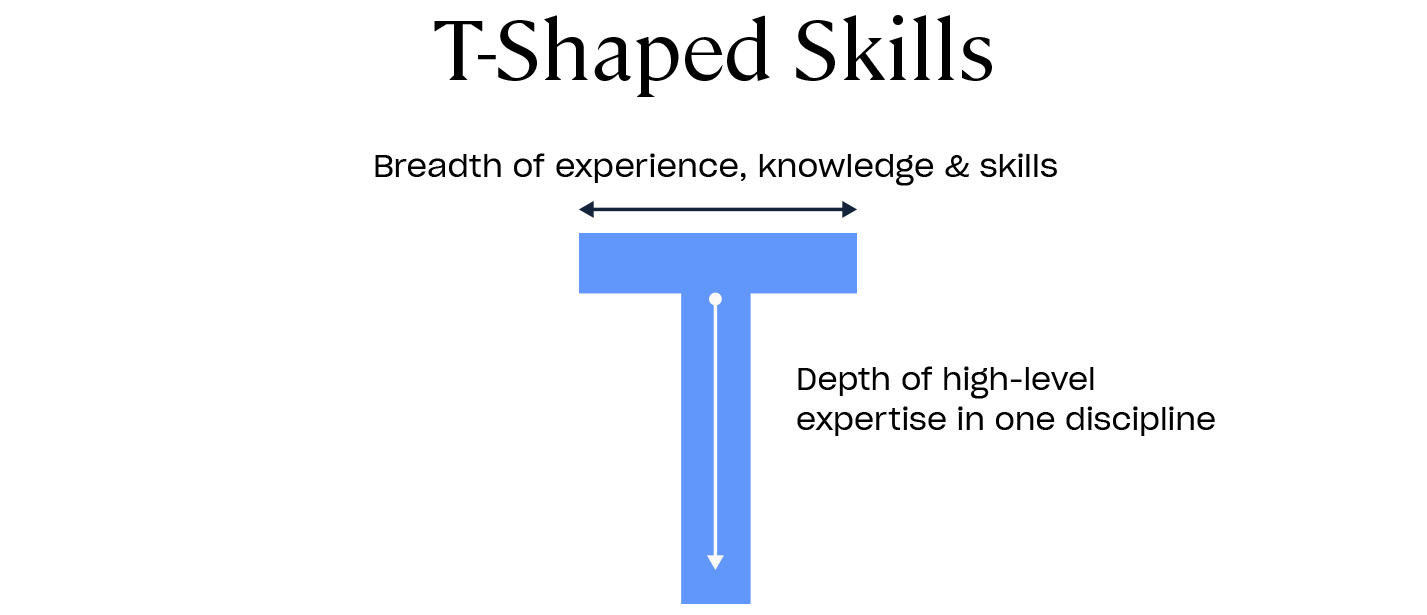What Does it Mean to be a T-Shaped Employee?
Nowadays, it is becoming more widely accepted that more than one fine-tuned skill set makes for a desirable employee. There are a number of factors and valuable skills that can be transferred from one role to another, across different sectors – making those who hold such skills invaluable and the demand for such a trait far more sought after.
T-shaped employees are valuable members to have on your team and as a manager you should be looking out for these qualities. In this article, we will provide a brief explanation as to what a T-shaped employee is, what are considered T-shaped skills, as well as how to create T-shaped teams.
Looking to become T-Shaped?
We offer a range of Business Skills courses and Personal Development training, each designed to provide you with the knowledge needed to help you upskill and grow.
What is a T-Shaped Employee?
A T-shaped employee is someone who has specialised knowledge and skills in a particular area, as well as the desire and ability to make connections across different disciplines.

The notion of a T-shaped employee is a quickly emerging trend in the world of employment. Now more than ever, transferable skills are invaluable to many companies and those with a combination of expertise and broad ability to learn and develop are at an advantage. To find out more about the importance of transferable skills, check out our article here.
With the right support and guidance, everyone has the potential to grow and to become more T-shaped. You, as a manager, have the opportunity to educate individuals on the benefits, both personal and professional, of T-shaped characteristics.
In addition to technical skills – for example proficiency in programming or design expertise – T-shaped people also possess cognitive skills like emotional intelligence and creativity. Those with T-shaped characteristics often have the ability to form lasting relationships and connections, contribute and problem-solve. This makes them high-performers who can boost your organisation’s overall productivity.

With the right resources and attitude, anyone can become a T-shaped individual. If you can see that an employee already has an area of expert skill alone, perhaps consider looking into helping them broaden their knowledge across other avenues. If they have a wider breadth of knowledge in a number of skills, you could work with them to choose one and commit to making it an area they excel in.
No matter the stage in your career, or what position you are in within a company, there is always an opportunity to develop yourself. You, as a manager, have the ability to help prospective and existing employees achieve this, too. Take a look at our online personal development courses to find out more here.
What are T-Shaped Skills?
Of course, everyone is born with different skills and abilities. Some people are a one-trick pony, contributing their expertise alone, while others seem to take to a hoard of skills – the jack of all trades. A T-shaped employee falls neatly in the middle of these two opposites. Landing on either side of the spectrum, though, is not necessarily a bad thing and you can provide your employees with the support and resources to become more T-shaped.
As we have already discussed, T-shaped employees are highly valuable to any company. Examples of skills evident in many T-shaped people include:
- A broad knowledge about a particular topic.
- A broader context for your specialised skill set.
- A basic knowledge of how humans and society work.
- Understanding of the industry you work in.
- Basic knowledge of how the business world works.
- Soft skills – sometimes referred to as ‘interpersonal’ or ‘people’ skills. These are subjective and harder to measure – for example:
- Teamwork.
- Communication is essential in any team. To find out more, check out our course here.
- Time management. To find out more you can take our Time Management Training course.
- Basic IT skills.
- Tolerance and open-mindedness.

Advantages of Hiring T-shaped Individuals
Employing T-shaped individuals is widely understood as being very beneficial not only on an individual level – perhaps as a manager – but also company wide. Core skills and the ability to learn quickly are just a few reasons why T-shaped employees excel in their main responsibilities, but they also perform other tasks throughout the business effectively. Thus, they contribute to the growth of the business.
Specifically, they offer these advantages:
- Core skills. T-shaped employees excel in their main responsibilities within their job role. This also means they are great resources. The deep expertise that a T-shaped employee will display to push discussion forward and encourage movement is undoubtedly a huge benefit to the organisation as a whole.
- Better communication. Largely due to their interpersonal skills, they are able to empathise with people and understand their needs – across the company as a whole.
- Better collaboration skills. This goes hand in hand with an ability to communicate well across the company, as they can discuss matters and work well over the entire organisation.
- Flexibility. T-shaped employees are flexible enough to take on new tasks alongside their workload without compromising on the quality of work – achieving their immediate goals whilst helping out around the company.
- They see the whole picture. Those who chiefly possess a very specific skill set (I-shaped employees) are of great value. However, they can often fall into a habit of tunnel vision – drilling down on their own subject area and neglecting other areas of importance. T-shaped employees, on the other hand, are able to apply their specialised knowledge and desire to learn to other areas of the business and projects they may be working on.

How to Create T-Shaped Teams
T-shaped teams are highly beneficial to companies but they have previously been seen as difficult to create as historically, companies are built from a foundation of specialist individuals. This is no longer the case, especially as it becomes more widely accepted that transferable people and skills are actually synonymous with success. In fact, reports show that a UK worker will change employer every five years on average.
T-shaped teams add value to the wider company by:
- Providing agile ways of working.
- Becoming more cross functional and balanced – in their formation and growth.
- Increasing team stability and security.
- Promoting diversity, which is inevitable when you combine skills and expertise from different people and walks of life.
- Giving employees the ability to rotate their jobs so they don’t get bored in just one rigid role.
- Providing greater collaboration. More minds with more transferable skills and many areas of expertise breeds innovation.
Each of these can help your team to become more collaborative and productive which, in turn, will benefit the wider business. But how to work towards building a T-shaped team? Unless by some luck you end up with a team of flawless ‘T-like’ individuals, it may take some time and effort.
Firstly, you should try to understand what employee types you do have and their given skills. Utilise the positives that you currently have within your team, and build on weaker areas.
Self-assessments can be key here; you could ask your employees to rate themselves in how confident they feel in certain topics. After employees undergo this, you must then determine:
- Where you want staff to improve their knowledge and/or ability.
- What level of skill should be maintained.
- What you want to add to the team by increasing breadth of knowledge.
- Any areas you feel would benefit from specialist expertise.
Encourage your employees to develop a mix of both soft and hard skills; these are invaluable and allow for greater transferable talents. You should regularly evaluate progress and ensure regular communications and 1-2-1’s with staff to maintain momentum, and be available to assist where you can.
Encouraging growth in breadth and depth of knowledge will be hugely beneficial for your employees on an individual level in their own personal development, but it will also be of great value to the wider company. For more information on leadership and management, check out our course, here.
Benefits of a T-Shaped Team

As mentioned above, a team which possesses a mix of skills is far more likely to be successful – lending itself to a more diverse and stable workforce. If your team holds a range of skills rather than one specific skill set, your organisation will be able to:
- Minimise dependencies between teams, resulting in fewer challenges with coordination and differing priorities.
- Reduce handoffs between knowledge silos, avoiding information loss.
- Broaden and deepen the individual team members’ skills over time through collaboration.
- Foster team ownership of the whole solution.
The future world of work is likely to become more T-shaped and transferable skills are widely recognised as holding the same status as technical skills. Utilise our top tips and become T-shaped to get the most out of your job, your team and your company.
For any more information, feel free to get in touch. High Speed Training offers a wide variety of courses and resources that can help.
Further Resources:
- What is the Importance of Digital Skills in the Workplace?
- Transferable Skills: What Are They and Why Are They Important?
- A Personal Development Plan (PDP) Guide & Template
- How to Upskill Yourself
- Why is Continuous Learning Important?
- Time Management Matrix – Free Template
- Business Skills Courses











